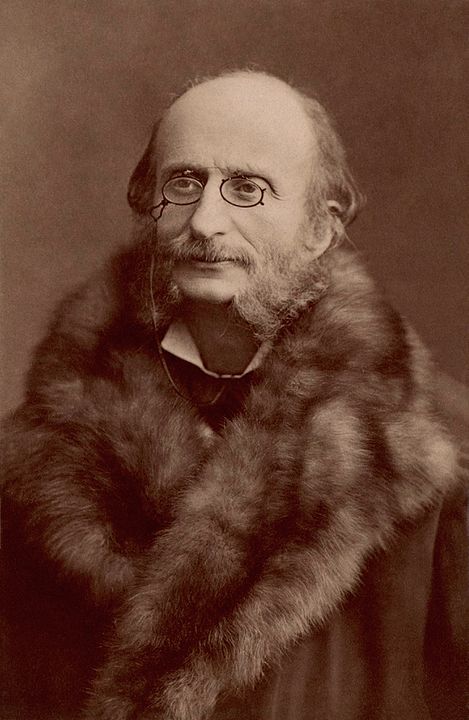Offenbach Sheet Music and Biography

20 June 1819-5 Oct 1880
Jacques Offenbach was a German-born (20 June 1819) French composer, cellist and impresario. His ambition was to compose comic pieces for the musical theatre. Known as a funny man, just like those he wrote about. His most popular pieces include Can Can from Orfeus (Orpheus) in the Underworld.
Despite his acceptance at the Paris Conservatoire at the age of fourteen, he decided that academics were not for him and left to earn his living as a cellist and composer.
Career
During the 1860’s he produced over eighteen full-length operettas’ including La belle Hélène, La Vie parisienne, La Grande-Duchessse de Gérolstein and La Périchole. The provocative humour, sardonic jibes together with Offenbach’s melody made these internationally famous. Translated versions were successful around Europe in particular in Vienna and London.
Offenbach blossomed under Napolean III ‘s regime with his humour and sarcastic barbs. He became known as his ‘The Mocking Bird of the Second Empire’. In addition, he was even granted French citizenship. However, when the Empire fell in 1870 to the Prussians, France was swept by violent anti-German sentiments. Consequently, Offenbach’s music lost its appeal with French audiences. He was even accused of being a German Spy due to his German upbringing. Fortunately, his successes in London and Vienna continued.
Family
Offenbach fell in love with Hérminie d’Alcain. However, before he could marry her he needed to be financially secure. Consequently, he began touring around France, Germany, and onto London returning with a newfound reputation and wealth. His next obstacle was to change his religion and become a Roman Catholic. Offenbach married at the age of 25 and their marriage was happy and lifelong, producing 5 children.
However, despite this happiness, he was prone to bouts of depression throughout his life.
The Can Can
*We are all very familiar with Offenbach’s Can Can from Orpheus in the Underworld. This may be through opera, music lessons, or on my part frantically kicking my legs up and down on the dance floor whilst desperately trying to cling on to the people at the side of me. This song always makes me smile and certainly not one to sit down to. We have five arrangements for this piece Can Can Sheet Music.
I challenge you to read this article whilst listening to the music…
In all seriousness Orpheus in the Underworld (Orphée aux enfers) was Offenbach’s first full length Operetta which was performed in 1858. His previous works were regarded as much less adventurous. but, this one was very well received.
Death
Offenbach suffered from gout in the 1860s and continued to work until his death on 5 Oct 1880. He died of heart failure at the age of sixty-one as a result of acute gout. He was given a state funeral.
Offenbach Sheet Music and Further Reading
We have a some downloads for you of Jacques Offenbach’s Sheet Music on music-scores.com.
For further information on this composer take a look at Wikipedia and Britannica.
Pingback: Georges Bizet: 25 October 1838 – 3 June 1875 - Music Scores Blog
Pingback: Richard Genée: 17 Feb 1823 - 15 June 1895 - Music Scores Blog
Pingback: Léo Delibes: 21 Feb 1836 - 16 Jan 1891 - Music Scores Blog
Pingback: Bizet: Georges: 25 October 1838 – 3 June 1875 - Music Scores Blog
Pingback: Delibes: Léo. Sheet Music and Biography - Music Scores Blog
Pingback: Genée: Richard. Sheet Music and Biography - Music Scores Blog
Pingback: Flotow Sheet Music - Music Scores Blog
Pingback: Composers Born in June